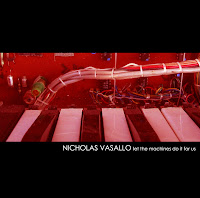Review: The Music of Nicholas Vasallo
 There is a current trend in thinking for some modern composers where live musicians are simply not capable of performing the music intricacy with the precision composers are putting into their music. Electro-acoustic music takes samples and distorts them in ways which are simply not possible during live performances. New Complexity provides music for live performers, but includes too much information for an actual performer to play live, so choices have to be made for performance. Nicholas Vasallo take a new direction, using machines to play organic instruments. Although the reasoning is similar to electro-acoustic music, the results are remarkably different. With electro-acoustic the sound can become less organic and highly effected, unnatural and at times (for me) video game-ish. Nick's music is alive and vibrant with the organic instrument.
There is a current trend in thinking for some modern composers where live musicians are simply not capable of performing the music intricacy with the precision composers are putting into their music. Electro-acoustic music takes samples and distorts them in ways which are simply not possible during live performances. New Complexity provides music for live performers, but includes too much information for an actual performer to play live, so choices have to be made for performance. Nicholas Vasallo take a new direction, using machines to play organic instruments. Although the reasoning is similar to electro-acoustic music, the results are remarkably different. With electro-acoustic the sound can become less organic and highly effected, unnatural and at times (for me) video game-ish. Nick's music is alive and vibrant with the organic instrument.The music in let the machines do it for us still has the rich sound because it's created by organic instruments. On this album the instrument is a piano or, more accurately, a modern-era player piano – the disklavier. The precision of the notes as evidenced in the first short piece, "Evanescent Revolutions I," is amazing. It takes a moment to adjust to the onslaught of sound, wholly organic and yet so complex our brains need time to comprehend what we're hearing.
Ligeti was a pioneer in using organic instruments in a way to create a sonic sound-scape. In Atmosphères Ligeti breaks the strings into individual instruments, rather than having the musicians play as a section. Add micro-tonality and the effect is not specific notes, but rather a blurred sonic experience --remarkable. Many years later, Ligeti turned to shifts in meter and rapid repetitive figures to create a similar effect with his piano etudes. Incidentally, Vasallo says these very etudes were influential in his work.
Returning to Nick's music, while the effect of music in "Evanescent Revolutions I-III" is complex, there is a sense of the organic the machines do not seem to capture. Whether it is because the music is so precise, or perhaps the subtle inflection differences a human hand can impress upon the keys that a machine doesn't capture, there is something about the music that still seems mechanical. With midi technology a composer can control the intensity a key has been played from 0 to 127. The human hand won't play two notes together with the same intensity so it is possible to program midi music commands to try and capture this nuance. The disklavier takes this midi commands and translates them into manipulating the hammers on the piano to play the notes. Reading through Nick's notes on his music, it appears the music was created mathematically and programmed into the disklavier. Perhaps if the lines had been written down, played into a midi recorder capturing that sense of human imperfection and THEN played by the disklavier it would have seemed less mechanical. The music has a sense of being programmed, an exactness that eventually equates to a sameness that fails to capture the nuance which humans are capable or producing, whether by accident or intent.
That said, there are places where the music succeeds extremely well. "Shades of December" and "The Crown Canon Variations" are ethereal and beautiful. Both pieces capture of sense of perpetual movement, while creating a sense of longing. The opening to "Shades of December" starts with brief notes where we're allowed to hear the lingering echo of sound and the overtones even after the sounded "note" has stopped, rather like the effect of the cold on one's cheeks after they've come in from outside. With "The Crown Canon Variations" it starts like a four part invention and yet becomes something only possible with 4 hands (or a disklavier), giving the canon new depth and character. Around 4 mins into the piece the music combines the sustain in the lower register while the upper canon completes creating an eerie anticipation, which is nicely followed by a return to the "invention" of the opening only much slower. Both pieces are remarkable, inventive and capture something super-musical, beyond the human performer.
While at times stunning and perhaps even a bit overwhelming (in a good way), the overall effect of the music left me wanting, longing for something that had more of a human touch to it. I think Nick is on to something new and exciting in terms of music possibilities. Heading in this direction look for great things to come. I'm just not sure he's there yet.

Comments